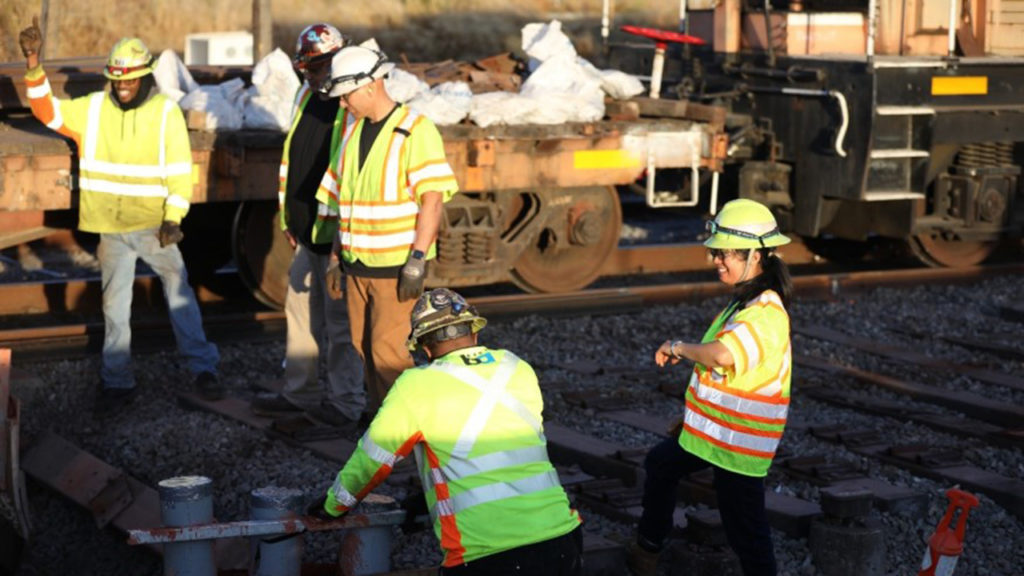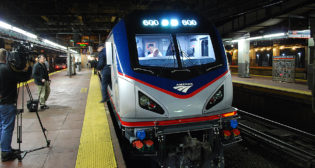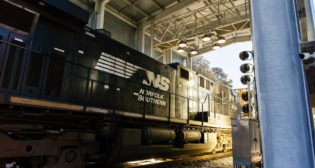
How One BART Track Operator Forged Her Own Path
Written by Bay Area Rapid Transit Communications Department
Thu Nguyen. BART photo
Editor’s Comment: Here, courtesy of Bay Area Rapid Transit, is an inspiring story of a young Vietnamese immigrant who, seeking a better life, came to the United States. Thu Nguyen is just one example of how the rail industry is embracing ethnic, cultural, racial and gender diversity. She, and others like her, are the future, not only of rail, but of America. This story was written for the general public—hence, the simplified, “non-railroad-jargon” language, but it’s well worth reading for us “industry folk.” – William C. Vantuono
On a recent Saturday morning, Thu Nguyen made her way to BART’s Hayward Maintenance Complex, where a dozen workers were busy uprooting old track and laying the groundwork for a new track switch under the morning sun. When Nguyen arrived, the workers—all men—in their bright yellow safety vests and hard hats, greeted her with exclamations and smiles. “Hi, everyone!” said Nguyen, smiling back.
Nguyen has worked at BART as a track worker for two-and-a-half years. Recently, she was promoted to track operator, meaning “I have a little more responsibility,” she said.
Nguyen’s ambitions do not stop with track operator. Once she passes her TOEFL (Test of English as a Foreign Language) assessment, a standardized exam that measures English proficiency, she intends to pursue a master’s degree in Transportation Management from San Jose State University. BART offers employees who pursue the degree from SJSU large financial support packages.
Nguyen’s path to track operator was not an easy one. She grew up in rural Vietnam, where she worked in the fields of her family’s farm. “From a young age, I did a lot of physical work. I learned [from the time I was a child] to do what is happening here,” she said, gesturing at the men working around her.
In young adulthood, Nguyen received a bachelor’s degree in biology from a university in Vietnam, but she sought new pastures. She moved to Israel to learn agriculture, then to San Diego in 2016. Moving to the U.S. was difficult for Nguyen, who struggled with family and adapting to a new culture and language. A few years after moving to San Diego, Nguyen packed up her daughter and her things and set out for Oakland. She had $300 in her wallet, no job, and no housing. “I moved to Oakland, and from there, things changed,” she said. “I [realized I could] do a lot more than I imagined.”
Nguyen eventually connected with the Cypress Mandela Training Center, which offers free pre-apprenticeship program for Bay Area residents to BART opportunities. Over the course of 16 weeks, Nguyen and fellow trainees learned the basic skills required for track and structure work on BART. On any given day, trainees might be putting pen to paper in the classroom or working in the open air, swinging a spike maul or learning to handle biohazards.
“Cypress Mandela not only provides opportunities for careers, but the opportunity to work on something that’s meaningful,” said Eric Shanks, Executive Director of Cypress Mandela. “BART is like a family. It’s important to have people work on these rail lines and have a sense of ownership and pride over that work.” Upon graduating from Cypress Mandela, the trainees receive further training from BART, which provides opportunities to acquire more skills and a chance to get promoted.

Track work is hard, but fulfilling, Nguyen said. “I learn something new every day.” Nguyen likes the “mechanical” aspects of her work—breaking things down then figuring out how to build something new in its place. “I’m a hands-on, physical person, so it works very well for me,” she said.
Working with mostly male colleagues hasn’t been a problem for Nguyen. She said her colleagues “make me stronger”—and she likes that the men rarely “hold a grudge.” “You have to let them know you’re willing to learn and try a new thing,” she said. “I tell them I’m ready to learn. I might make mistakes, but I’ll try to get better.”
Nguyen brings a special zest to the workplace, too. “What I give to the environment, give to the coworker, is a smile,” she said.
Nguyen’s supervisors and coworkers said she brings much more than a smile to the track. Rene Cruz, BART section manager, track maintenance, called Nguyen “one of our hardest workers.” “She doesn’t stand around; she’s always moving, looking for stuff to do,” he said. “She doesn’t wait around for you to tell her to do something.”
Jaime Ramirez, system service foreworker, said Nguyen is “no-holds-barred.” “She’s not afraid of the work,” he said. “She just goes for it.”
Nguyen doesn’t exactly stop working after work. In addition to taking care of her ten-year-old daughter, Nguyen volunteers with Habitat for Humanity, where her construction skills come in handy. She’s practicing her English to pass the TOEFL. She watches YouTube videos to learn how to manage her finances. And on Mondays, “I treat myself” to a long hike, she said. Sitting still is not exactly Nguyen’s M.O.
In five years, Nguyen said she hopes to have her master’s degree at San Jose State University and to continue working track. And she’ll never, ever stop learning. “Don’t look at the challenge as the thing you must do,” she said, stringing pearls of wisdom. “Look at the challenge as an opportunity to learn, an opportunity to experience something … You need to know suffering to know happiness. You need to be challenged to appreciate your achievements. And if you don’t try it, you’ll never know what could have been.”



